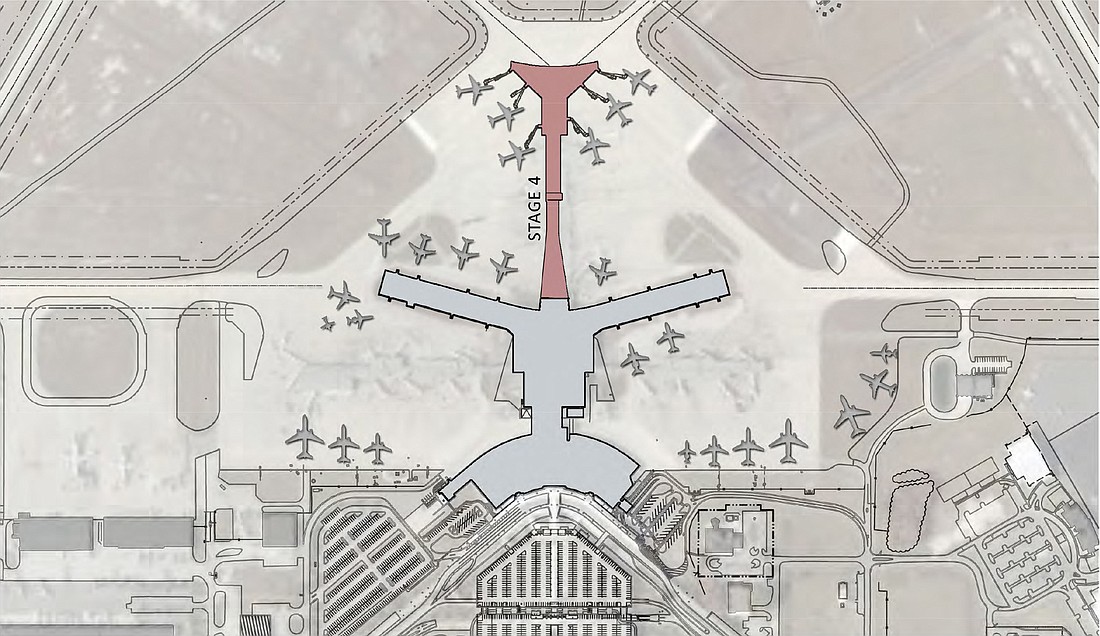
Groundbreaking is nearer, but not scheduled, for the estimated $300 million Concourse B at Jacksonville International Airport, which was expected to start construction this year but is now anticipated in the summer for completion by the end of 2026.
The city is reviewing a building permit application for a $200 million construction project to expand the North Jacksonville airport with the new six-gate concourse.
Balfour Beatty Construction LLC of Orlando is the construction manager at risk for the work on the three-level, 186,733-square-foot project at 2400 Yankee Clipper Drive.
In that role, Balfour Beatty oversees the project from design to construction completion with a guaranteed maximum price. That will be determined in the next few months.
Greg Willis, Jacksonville Aviation Authority marketing and public relations manager, said Sept. 18 that JAA did not have an absolute date to begin the concourse construction.
The airport has one main terminal with two concourses totaling 20 gates, comprising 10 each for Concourse A and Concourse C.
Concourse B is designed as six gates and can add another two to four gates when needed.
The first Concourse B was demolished in 2009 after Concourses A and C were rebuilt in 2008.
Willis said in September the authority is waiting on the Federal Aviation Administration to finish reviewing and approving several studies before JAA can proceed with construction.
JAA Director of External Affairs Michael Stewart said Dec. 12 the permit application is preliminary work as the authority awaits those studies.
“We are gearing up,” he said.
When JAA opened Concourses A and C in 2008, it anticipated adding Concourse B in 2014-15.
That’s because the FAA recommends that airports prepare for expansion when they reach about 65% of terminal capacity, which happened at JAA in 2008.
Then the Great Recession in 2008-09 resulted in a downturn in financial markets and travel.
By 2018, JAA returned to 2007 traffic levels and resumed plans for Concourse B.
At that time, JAA was not required to perform an environmental assessment because the new concourse was the same footprint as the former Concourse B.
The 2020 pandemic created another delay, loosely expected to be at least five to seven years in the absence of knowing how COVID-19 would play out.
By last year, JAA realized the industry had recovered and resumed designing Concourse B.
But then, the FAA required a new environmental assessment, which began about the first of this year and could take up to a year to complete.
In June-July, the FAA also realized the preliminary concourse design conflicted with two radar arrays of the radar system on the airfield, which led to a pause in the environmental assessment.
Stewart said both studies are on parallel tracks and JAA meets regularly with the FAA.
“We can request the permit review and probably order everything we need in the next few weeks or months, but we can’t put a shovel in the ground until they complete the environmental assessment,” he said.
Stewart also expects the FAA will work out the conflicts with the radar array and resume the assessment in January, which “puts us to getting a shovel in the ground this summer.”
Jacobs Engineering is the leading design engineer and Jacksonville-based RS&H Inc. is the subcontractor for the architectural portion.
The JAA board voted March 27 to ratify contracts with Balfour Beatty Construction LLC to purchase steel for the Concourse B project.
The contracts comprise a $24.57 million steel package to build Concourse B and a $2.6 million contract for the third phase of security checkpoint renovations at the airport.
Stewart said JAA didn’t order the steel because of the delays and did not want to be storing the material.
Stewart said Phase 1 – the new checkpoint area – is substantially complete and open for use during the holidays.
“When we have maximum days, we can operate all eight lanes if we have to,” he said.
Returning passengers now are shifted to a bypass at Concourse C. As that is upgraded, that exit will be moved to Concourse A.
When completed, there will be exits from both concourses.
Phase 2 is the bypass taxiway for aircraft. For now, planes have been parking in the area where Concourse B will be built, and that will have to change for construction.
Phase 3 is the construction of Concourse B.
Stewart said those two phases will take place in tandem.
JAA CEO Mark VanLoh said in May that costs for Concourse B had risen to about $300 million. In 2021, JAA estimated the project could be $272 million to $275 million.
JAA anticipates using $300 million in debt financing for Concourse B.
It expects to use about $175 million in passenger facility charges to repay the debt over time, according to a committee report.
The JAA’s annual financial report for the fiscal year that ended in September 2022 said the authority has spent about $261.33 million of revenue from passenger facility charges on projects funded on a pay-as-you-go and financing basis.
In 1990, Congress approved the Aviation Safety and Capacity Expansion Act, which authorized domestic airports to impose a passenger facility charge on enplaning passengers that can be used for qualified airport projects.
JAA had levied PFC charges at the rate of $3 per enplaned passenger since April 1, 1994.
As of May 2, 2003, the FAA approved an amendment to raise the rate to $4.50.
The amendment also permits the authority to finance certain projects with PFC revenue.
The financial report said JAA has submitted and received approval to collect $363.46 million since inception.